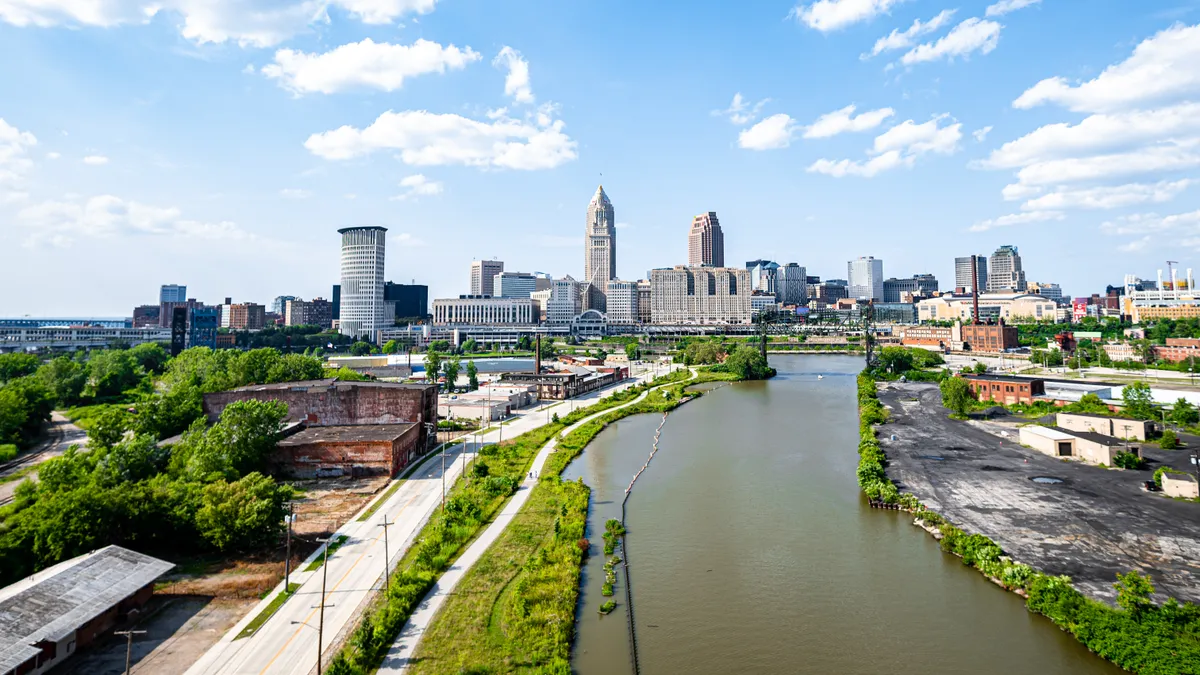Dive Brief:
- Cleveland has joined the ranks of U.S. cities pursuing a more circular economy, via a multi-year program aimed at "designing waste and pollution out of our economic system, keeping products and materials in use as long as possible, protecting and regenerating natural systems, and creating new jobs."
- Backed by a $476,000 grant from the Robert Wood Johnson Foundation, the Circular Cleveland initiative seeks development of a roadmap for a circular economy within 12 months, before spending approximately 18 months to implement it. Steps will include setting up a composting site at the indoor-outdoor West Side Market and supporting a series of projects through the Cleveland Climate Action Fund. Cleveland will also become an Ellen MacArthur Foundation Network Partner.
- At the same time, Cleveland has still not restored citywide curbside recycling service. Recycling ceased early in 2020 after the existing contract ended and Cleveland did not secure a new contract, which city officials in part attributed to a high rate of contamination. It was subsequently revealed that recycling being picked up by the city was being taken to landfills.
Dive Insight:
Pursuing a circular economy model has become increasingly mainstream in the U.S. as cities set sustainability targets and look to revitalize local recycling markets. Cleveland's efforts were preceded by actions in Phoenix, Charlotte, North Carolina, and Austin, Texas, among other major urban hubs that have taken coordinated steps to make waste reduction an integral consideration in daily life and operations.
In Cleveland's take on building a circular economy, inspiration has come from cities like Toronto and Chicago, said Divya Sridhar, manager of climate resiliency and sustainability at Cleveland Neighborhood Progress, a partner on Circular Cleveland. Sridhar thinks one potentially differentiating factor for Cleveland's program may be its focus on equity and access, including the opportunity for small community grants of $500 to $5,000, which organizers hope to roll out by summer.
A request for proposals for developing that roadmap will be posted next week, Sridhar said, with hopes of completion around November.
In addition to trying to create incentives for small businesses engaged in circular economy efforts, the program places special emphasis on increasing access to composting. Outside organizations like Rust Belt Riders run composting infrastructure in the area but residential curbside composting is not available through the city. In addition to establishing the West Side site, the Cleveland Climate Action Fund that will be incorporated in Circular Cleveland has in the past supported various compost initiatives.
Still, through the circular economy lens, composting can be viewed as "the last strategy," Sridhar said, in favor of reducing food waste from restaurants, grocery stores and other sources.
Circular economy considerations came up in a discussion last week among members on the City Council Development, Planning and Sustainability Committee.
"One of the items I hope we're looking into is the first 'R' that we always forget, which is the 'reduce' — how do we work with the community to reduce the consumption on the front end, in addition to, once we consume a product, what we do with that packaging or product," said Councilman Kerry McCormack at the Jan. 5 meeting.
That committee meeting was specifically being held for council members to share feedback regarding Cleveland's waste and recycling services with representatives from GT Environmental, the consulting group contracted by the city last year in light of the collapse of the recycling program.
GT spent months putting together a report on not just recycling, but also analyses of solid, bulk and commercial waste pickup, staffing issues, efficiency of collection routes, and more. The group also consulted The Recycling Partnership to examine recycling programs in cities similar to Cleveland, said Jim Skora, a senior manager at GT.
The city also tasked GT with considering how to reduce waste and move forward toward a circular economy, said Darnell Brown, Cleveland's chief operating officer, during the virtual meeting.
While GT had hoped to complete the draft of the report by the end of 2020, one of the last key steps was last week's committee discussion, and Skora said that the report — which will include recommendations to the city — would soon be submitted to the mayor's office, which would then share it with the city council and make it publicly available.
The waste stream analysis set to be available in that report will be "foundational" to understanding consumption patterns and help inform the Circular Cleveland roadmap, Sridhar said.










